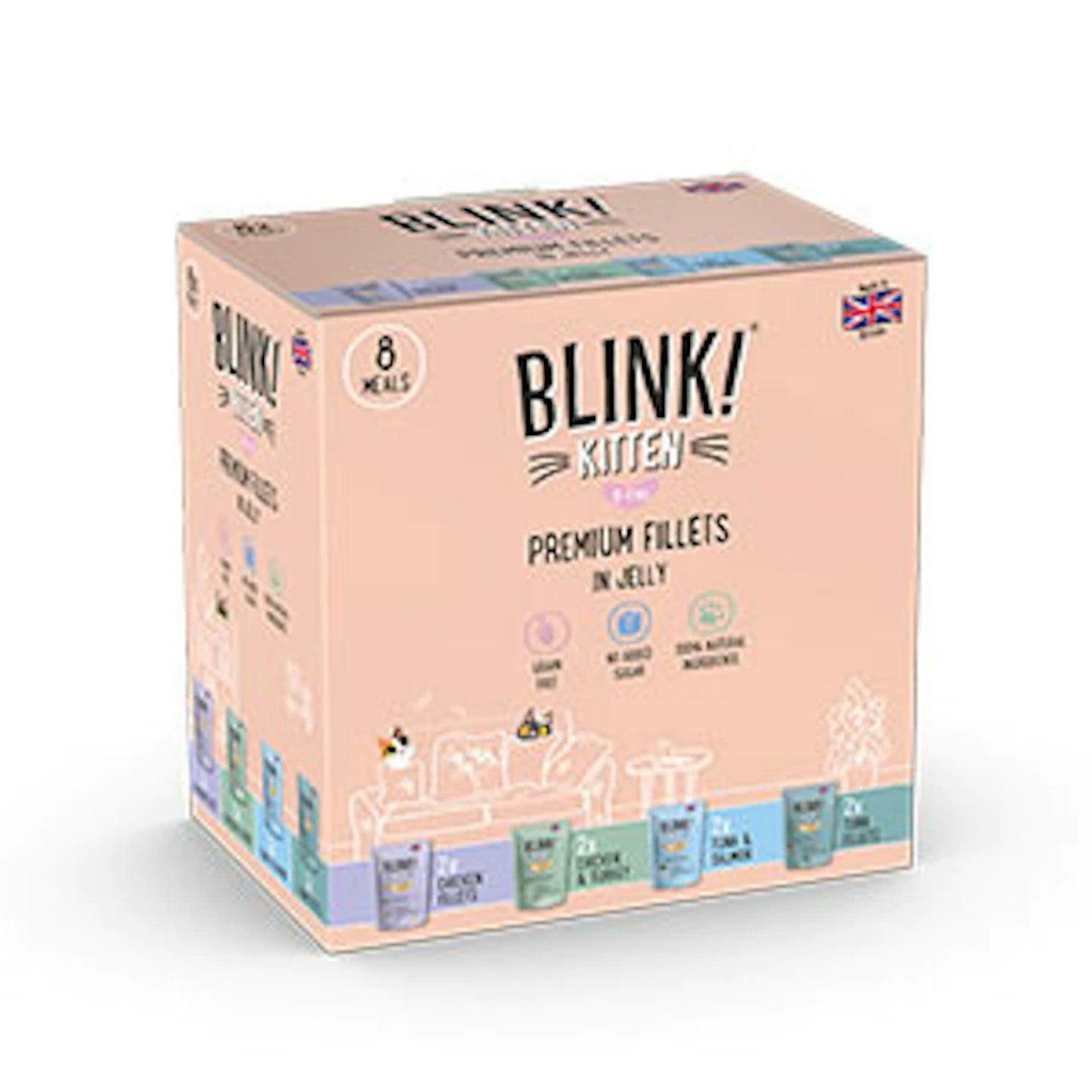The best cat food for itchy skin and allergies can help to resolve skin problems and sensitive stomach issues. Over time cats sometimes develop an allergy to an ingredient in their food. The immune system reacts to a food type as a threat and responds to it aggressively. Scratching or hair loss can be a sign of a food allergy or intolerance, as well as vomiting and diarrhoea. By switching to hypoallergenic and single-source protein foods you can save on vet's bills and make a miserable moggy feel a lot better.
First, you need to identify the cause of your cat's discomfort. A skin allergy can be triggered by flea bites and environmental factors - such as pollen, mould, grass or dust mites. The PDSA recommends that you vacuum regularly and don't use air fresheners. Also, keep your cat indoors when the pollen is high if you suspect it's a trigger. If it's fleas that are causing your cat's discomfort there's a plethora of flea treatments to combat the itchy blighters.
Best cat food for itchy skin and allergies at a glance
If your cat's not getting on with their cat food they could have an allergy to a certain ingredient. Some of the most common allergies are caused by ingredients that you find in many cat foods, such as chicken, beef, fish, dairy and eggs. Putting your cat on a food-elimination diet is one way of singling out an ingredient that's become an irritant. It can be difficult to do a food-elimination diet, so in the first instance try hypoallergenic cat foods. More about that in the FAQs below, plus expert advice from Take A Break Pets vet columnist, Dr Michael Lazaris.
If you notice your cat is over-grooming, and their skin is itchy, inflamed or has developed rashes and fur loss you must seek a diagnosis from your vet. Skin supplements and medication can be prescribed by vets in more severe cases. Make sure you check your cat all over - armpits, inner thighs and stomach as well as the obvious head, neck and back. You need to get to the root cause of the allergy otherwise it can cost a fortune in medication. Additionally, it's not good to use medication such as steroids for a long period of time. Changing your cat's diet to a specially formulated food can alleviate the condition permanently. Here's our round-up of the best hypoallergenic food for cats with intolerances.
Best cat food for itchy skin and allergies
Best overall sensitive cat food
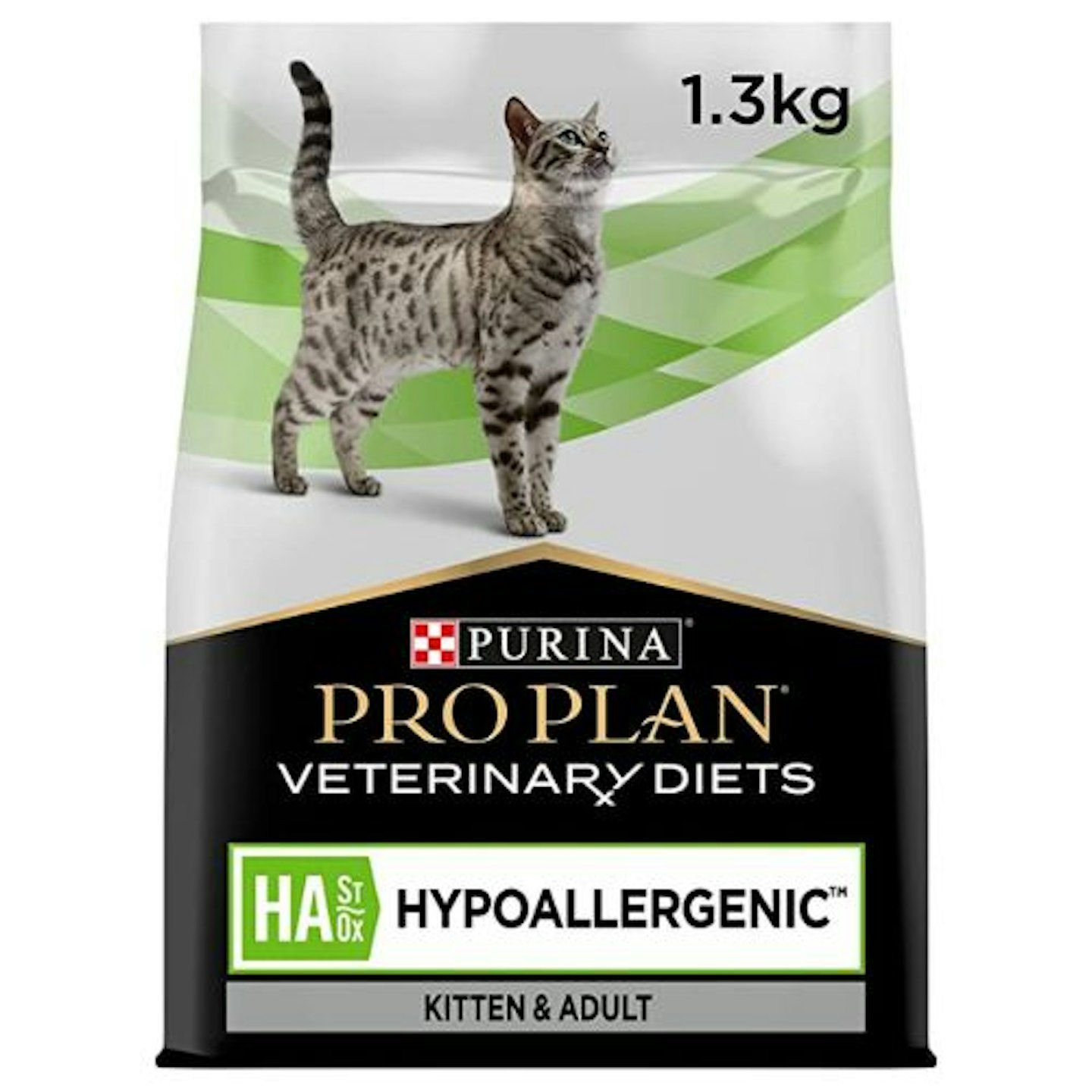 Purina
PurinaThis Purina Pro Plan Veterinary Diets Hypoallergenic Dry Cat Food has hydrolysed protein broken down into components too small to cause an allergic reaction, which is what makes this food great for an allergy and intolerance elimination diet.
The blend of nutrients and ingredients has been specifically chosen to avoid any allergic reactions for cats of all ages, including kittens. It has hydrolysed soya protein and rice starch as main ingredients so you can slowly reintroduce allergens in your cat's diet to see what is the cause of their skin issues.
As with any elimination diet recipe, this food isn't designed to be fed to your kitty long term but it can be helpful for allowing you to identify any ingredients that are causing your feline friend any bother.
Pros
- Hypoallergenic as it contains hydrolysed protein
- Highly digestible with hydrolysed soya protein and rice starch
- Very effective results for kittens and cats with sensitive stomachs and allergies
Cons
- Seek the guidance of a vet for your pet's health issues as this food isn't sustainable as a long-term option
| Quantity: | 1.3kg |
| Food type: | Dry |
| Ingredients: | Rice starch, hydrolysed soya protein, soybean oil, minerals, cellulose, hydrolysed digest, pork fat, fish oil, carbohydrate source, protein sources |
- Suitable for: Cats with Adverse Food Reactions - Elimination diet for food trials - Long-term management of food allergy - Dermatitis and/or gastroenteritis associated with food allergy - Inflammatory bowel disease (IBD) Food intolerance - pancreatic insufficiency (EPI) - Hyperlipidaemia - Lymphangiectasia - Malabsorption - Protein losing enteropathy - Chronic diarrhoea - Small intestinal bacterial overgrowth (SIBO) - Pancreatitis
Best cat food for dry skin
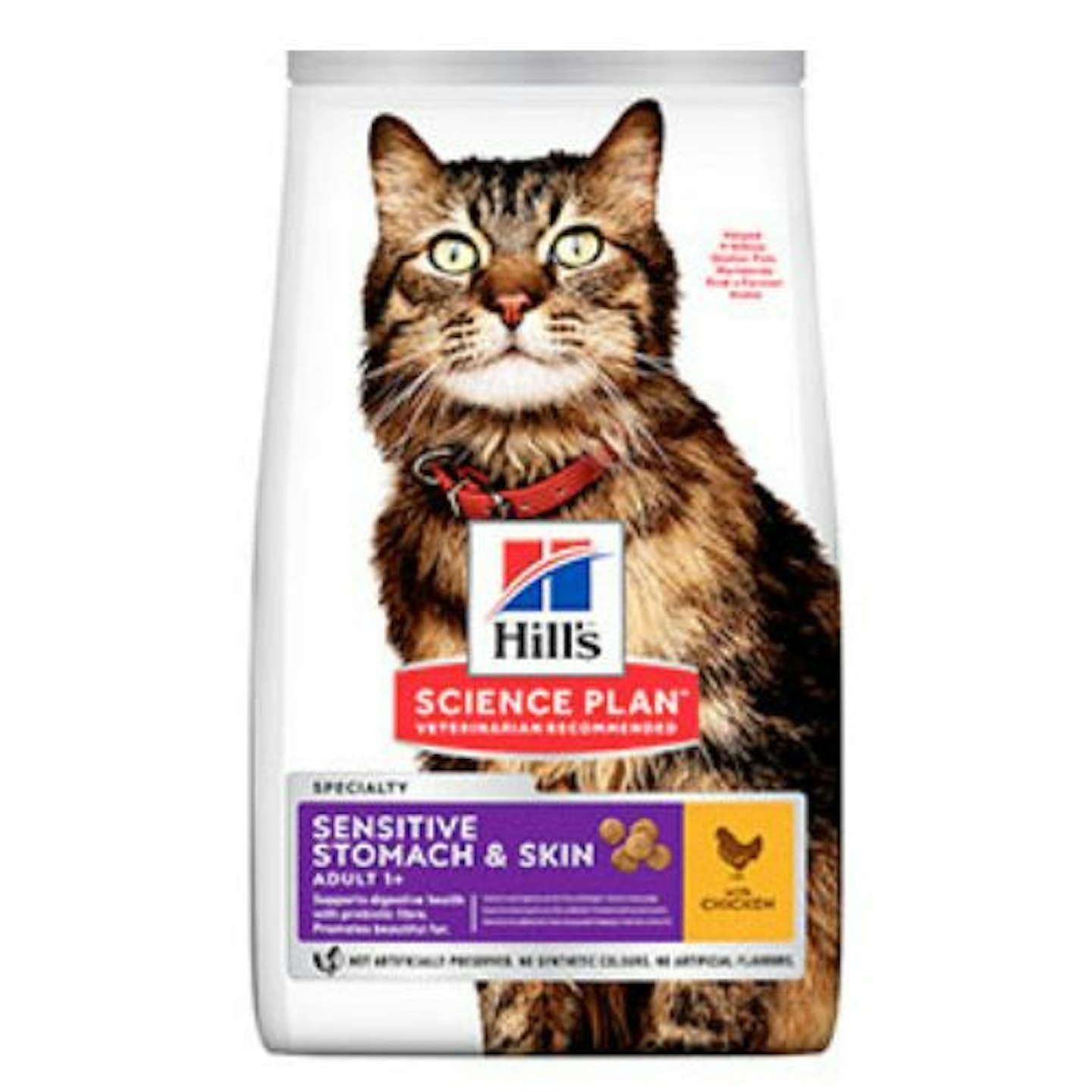 Hill's Science
Hill's Sciencewww.viovet.co.uk
Hill's Science Plan Sensitive Stomach and Skin Dry Cat Food is a double whammy, supporting cats with both sensitive stomachs and sensitive skin. Hill's cat food ingredients are suggested by vets and nutritionists, using easy-to-digest proteins and prebiotics which support skin problems, too.
It's packed with Vitamin E and Omega-6 fatty acids to help your cat maintain lovely fluffy fur and healthy skin and the recipe has beet pulp added to it to make it easily digestible for better nutrient absorption and is gentle on the stomach.
One customer felt the feeding guide wasn't overall accurate as they felt like their moggy didn't have enough food based on what the packaging was suggesting. Many customers sang the praises of this food and found their kitty's hair grew back lovely after skin issues and their tummy had now settled from eating this food.
Pros
- Contains easy-to-digest proteins
- Added vitamin E and Omega-6 for coat condition
- Added beet pulp to make it more digestible
Cons
- One customer felt the feeding guide could be more accurate
| Quantity: | 1.5kg |
| Food type: | Dry cat food kibble |
| Ingredients: | Brewers' rice, chicken and turkey meal, maize gluten meal, maize, animal fat, dried whole egg, dried beet pulp, minerals, digest, vegetable oil, flaxseed |
- Prebiotics support good gut health
- Vitamin E and omega 6 to nourish skin and fur
- Feeding guide: 60g per day for a 4kg cat
Best single-source protein cat food
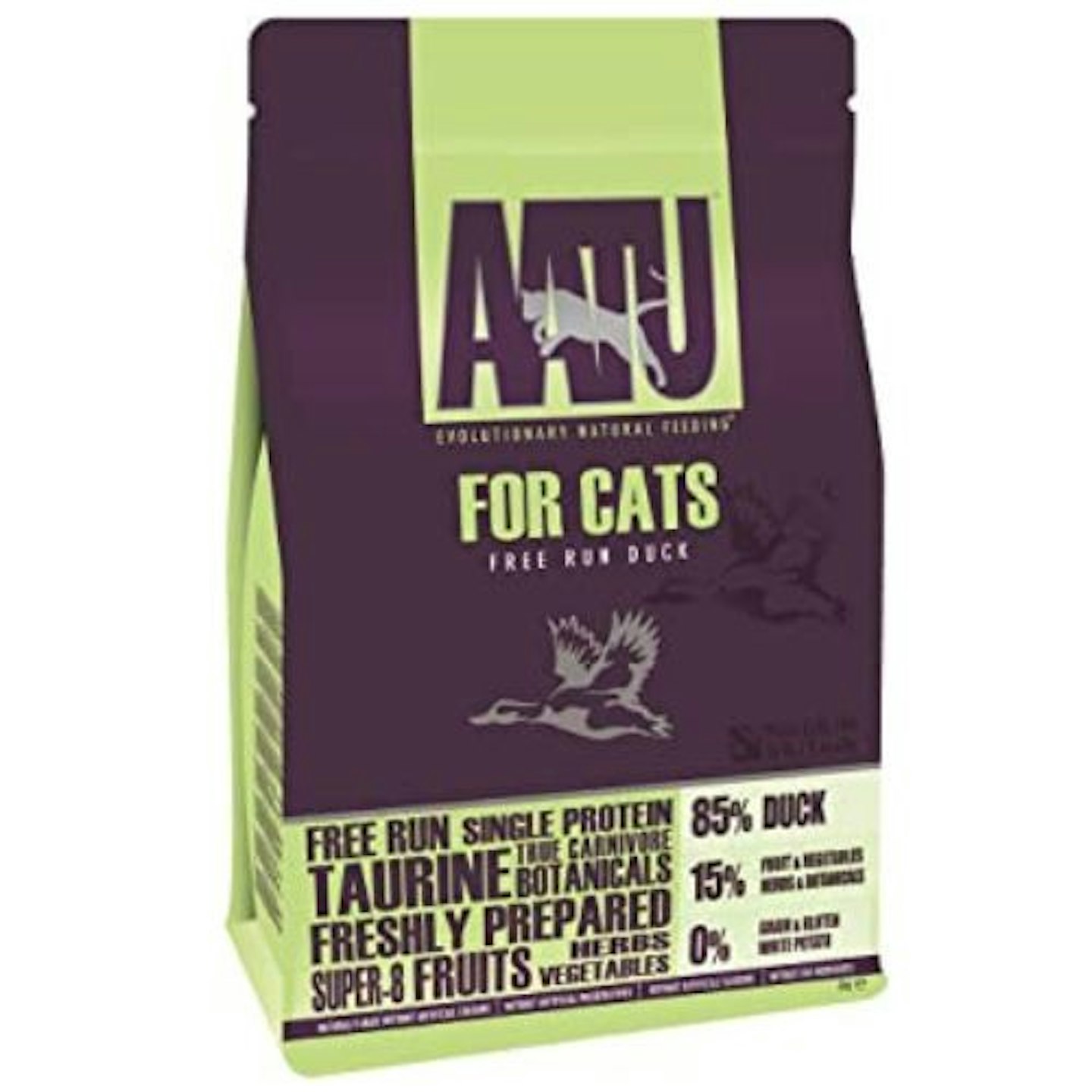 AATU
AATUDuck is a less common source of protein so your cat may benefit from switching to a novel protein if chicken, fish or beef are causing an allergy. AATU pet food is hand-crafted in small batches and is all-natural.
This AATU 85/15 Dry Cat Food contains 85 per cent meat that's a single source of protein from free-run ducks. The other 15 per cent is AATU's 'super-8' blend of fruit and vegetables, herbs, botanicals and spices to ensure your cat is getting a whole host of antioxidants. This is a dense and nutritious dry food; 50g a day for a 4kg cat is enough to give them all the nutrition they need.
Some customers have questioned the overall value of this food but the fact it's free from additives and fillers with no nasties or grains has made it worth it for many cat owners.
Pros
- Made with duck, which is a less common allergen
- All natural ingredients and made without nasties
- High levels of protein at its 85 per cent meat
Cons
- Opinions are mixed on the overall value
| Quantity: | 3kg |
| Food type: | Dry |
| Ingredients: | Duck, Sweet Potato, Chickpeas, Duck Stock, Peas, Lucerne, Tapioca, Apple, Cranberry, Pear, Blueberry, Mulberry, Orange, Bilberry, Cowberry, Carrot, Tomato, Chicory, Peppermint, Parsley, Cinnamon, Marigold, Stinging Nettle, Camomile, Rosehip, Yucca, Spirulina, Seaweed, Aniseed, Fenugreek, Oregano, Sage, Marjoram, Thyme |
- Totally grain free
- AATU are an Ethically Awarded independently owned British company
Best wet cat food for sensitive stomachs
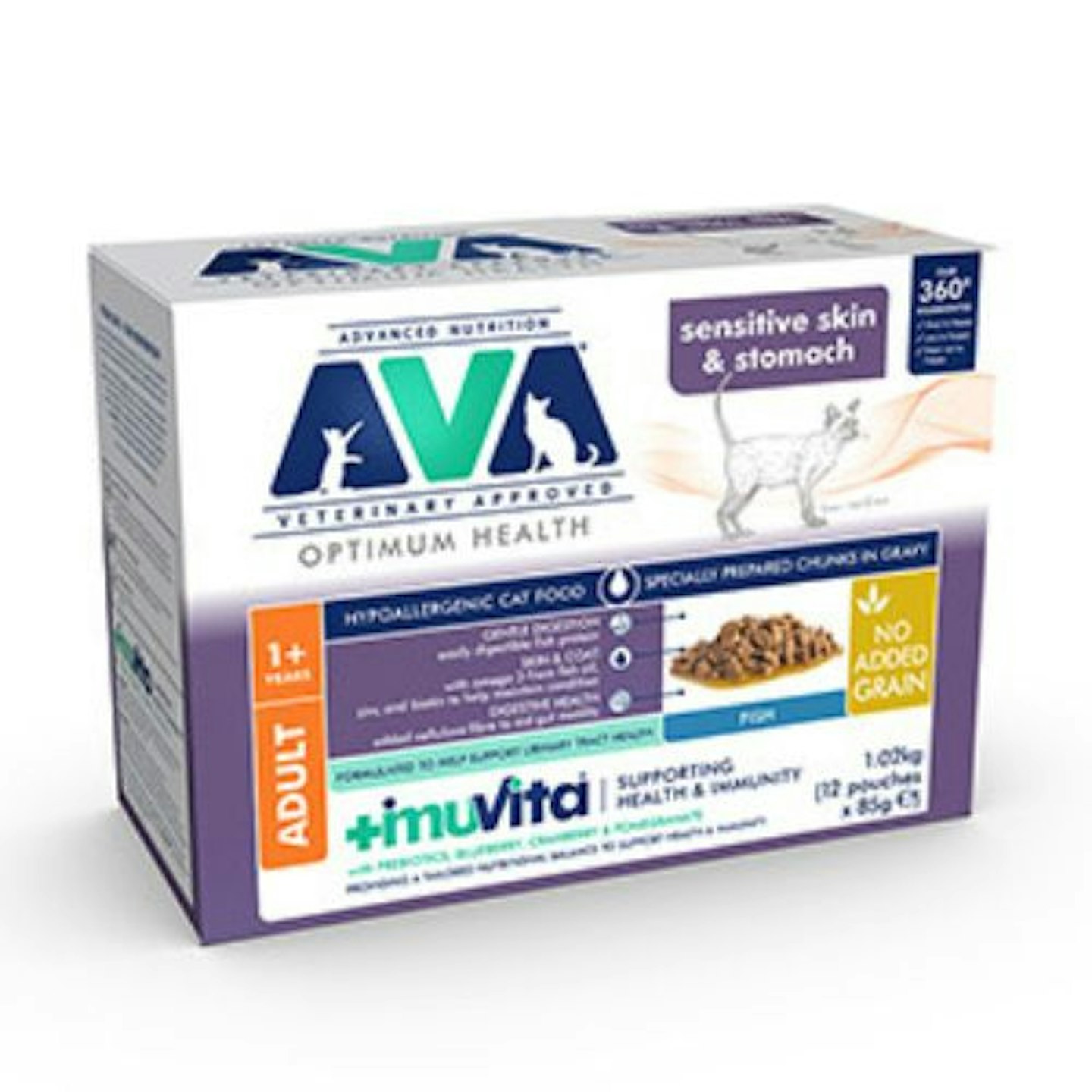 AVA
AVAwww.petsathome.com
AVA Veterinary Approved Optimum Health 1+ Sensitive Wet Adult Cat Food, for sensitive stomachs and skin, is one of our top choices for its hypoallergenic recipe with easily digested proteins.
A trusted brand, AVA is approved by vets. The recipe of this sensitive food is grain-free and gentle on digestion as it contains easily digestible fish protein. You'll also find tuna and fish oils inside, with the Omega 3 aiding with keeping your cat's coat and skin in tip-top condition.
There is only one flavour per pack so your kitty may soon get bored of eating the same thing at mealtimes, but reviewers have found this food has helped their cat to stop itching their skin and even the fussiest of cats enjoyed it.
Pros
- Contains Omega 3 to help with coat condition
- Easy-to-digest fish recipe with no grains
- Veterinary approved
Cons
- Only one flavour so your kitty may get bored of eating the same thing
| Quantity: | 12 pouches 85g per pouch |
| Food type: | Wet |
| Ingredients: | Tuna, Chicken, Sunflower Oil, Yeast Extract, Fish Oil, Minerals, Cellulose Fibre, Pea Protein, Tapioca Starch, Yeast (as a source of Prebiotic Mannan-oligosaccharides and Beta-glucans), Chicory Root Extract (as a source of Prebiotic Fructo-oligosaccharides), Yucca Extract, Glucosamine, Dried Blueberry, Cranberry Extract, Pomegranate Extract, Chondroitin |
- Hypoallergenic
- Completely free of wheat, wheat gluten, soya, pork and dairy
Best grain-free wet cat food
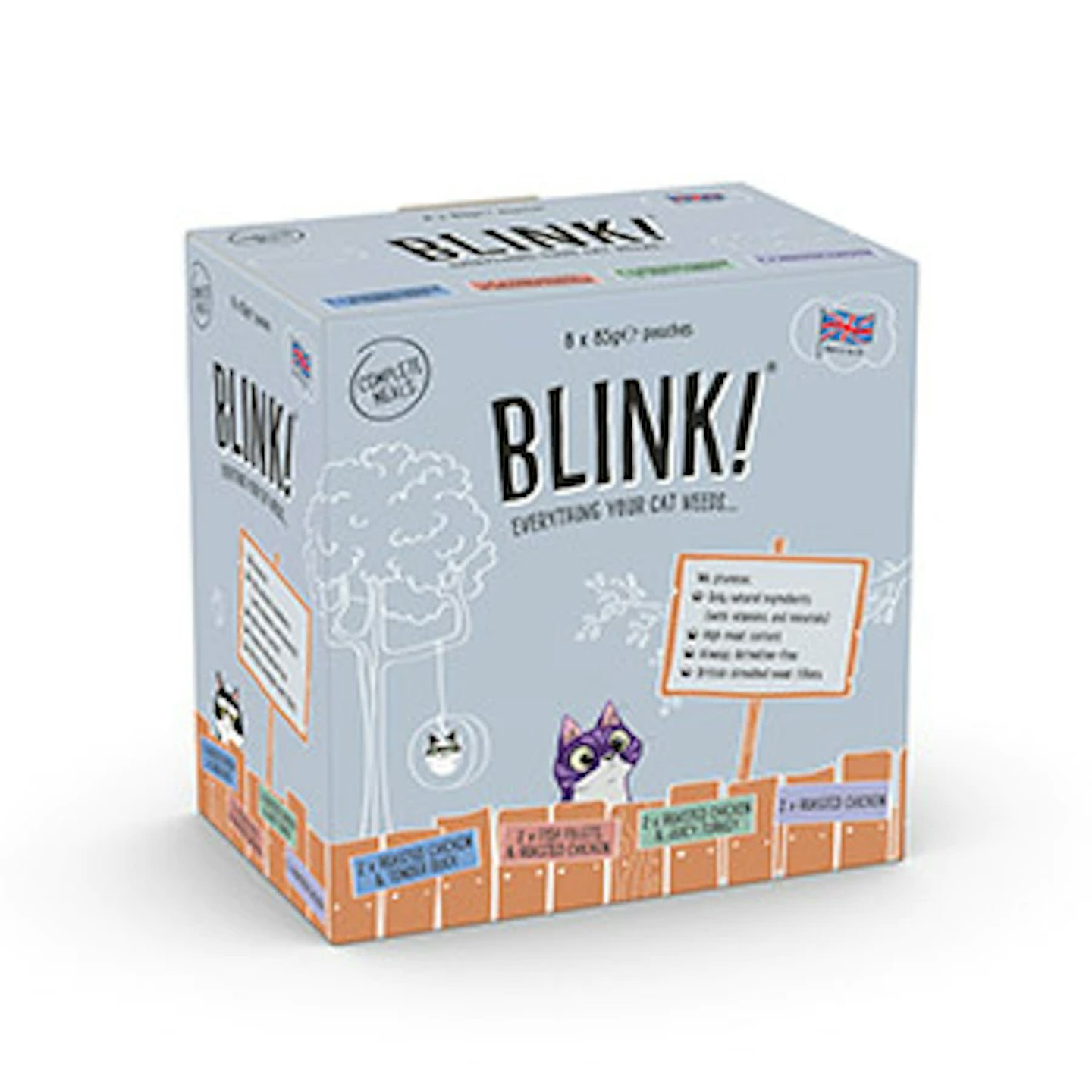 Blink!
Blink! www.sainsburys.co.uk
There isn't a cat food that is closer to home than this Blink! Chicken Selection Variety Pack Wet Cat Food. It's made right here in the UK and all ingredients are sourced from British farms.
With natural ingredients and no cheap fillers, this is great for any sensitive cat who likes to be spoiled. It's cereal, grain and sugar-free, too.
It contains four different chicken flavoured recipes, which is great for offering your kitty variety, but not ideal if your feline friend has an allergy to chicken. Many customers have reported that their cats haven't had sickness or loose stool since switching to the food and their kitties love to gobble it all up.
Pros
- Quality meat and ingredients
- Cereal, grain and sugar-free
- Four different chicken flavours
Cons
- Although there are four different flavours, each one contains chicken so may not be suitable if your cat has a chicken allergy or intolerance
| Quantity: | 8 x 85g pouch |
| Food type: | Wet |
| Ingredients: | British Chicken Fillets, Tender British Duck, Chicken Broth, Vitamins and Minerals |
| British Chicken Fillets, British Turkey Fillets, Chicken Broth, Vitamins and Minerals | |
| British Chicken Fillets , Chicken Broth, Vitamins and Minerals | |
| Flaked Salmon Fillets, British Chicken Fillets, Broth, Vitamins and Minerals |
- Feeding guide: 2.5 pouches per day for a 4.5kg cat
Best bulk buy skin and coat cat food
 Royal Canin
Royal Caninwww.viovet.co.uk
Royal Canin is a leading brand in cat food products and this ROYAL CANIN Skin and Coat Veterinary Health Nutrition Cat Food has been developed with all the expertise you would expect from a brand that prides itself on the tailored recipes it greats for cats of all breeds and conditions.
The composition of ingredients features hydrolysed proteins so it's digestible without causing a reaction. Additionally, this wet cat food is specially designed to boost skin and coat health with oils, such as Omega-3 and antioxidants.
With 48 pouches included in the price, this is a great option for those who like to bulk buy their food as it should last you and your cat a while. One of the main ingredients in this food is maize, so if your kitty is allergic or sensitive to grains, you should look at another option.
Pros
- Cost-effective to buy in bulk
- Specially formulated for skin health with added Omega-3
- Features hydrolysed proteins so it's easily digestible
Cons
- Maize is a main ingredient so not a good option for cats with grain allergies, sensitivities or intolerances
| Quantity: | 48 pouches x 85g |
| Food type: | Wet |
| Ingredients: | Pork by-products, poultry by-products, wheat flour, salmon, hydrolysed pork gelatine, powdered cellulose, wheat gluten, sunflower oil refined, minerals, pork blood products, fish oil, caramelised sugars, borage oil, marigold extract (source of lutein) |
- Suitable for young and adult neutered cats from 6 months up to 7 years
- Atopic Dermatitis, skin and coat support in case of other dermatitis such as, Flea Allergic Dermatitis, skin infections or external parasites. Post neutering. In association with medical treatment (such as antiparasitic or antibiotic medications) if needed.
Best dry cat food for sensitive seniors
 James Wellbeloved
James WellbelovedThis James Wellbeloved, Dry Senior Cat Food Fish will be sure to sort out your senior cat (aged 7+) who has been going off their food. Hypoallergic - ideal for sensitive cats - this mix only contains natural ingredients, with no common allergens in sight (such as beef, soya, eggs and wheat).
It's packed with nutrients to nourish your grumpy old cat who is in their senior years... from natural prebiotics to Vitamin E to Taurine. It also contains chicory extract which is great for gut health, resulting in less smelly stools.
As you would expect for a fish-flavoured food, customers have reported it does have quite a strong smell, so while it may not be a favourite with you, your kitty will LOVE it.
Pros
- Great value dry cat food with nutrients
- Support mature cats' immune system with natural prebiots and other nutrients
- Hypoallergenic cat food for pets with sensitivities
Cons
- Fish smell is strong but your cat will love it
| Quantity: | 1.5kg |
| Food type: | Dry |
| Ingredients: | Fish (meal, oil, stock), brown rice, white rice, maize gluten, olive oil, pea protein, potato protein, tomato pomace, carrot, potassium chloride, chicory pulp, chicory extract, calcium carbonate, sodium chloride, cranberry extract, glucosamine, nettles, yucca extract, rosemary extract, chondroitin, green tea extract, pomegranate extract |
- Excludes common allergens such as beef, pork, soya, eggs, dairy and wheat
- No added artificial flavours, colours or antioxidants
Best for sensitive indoor cats
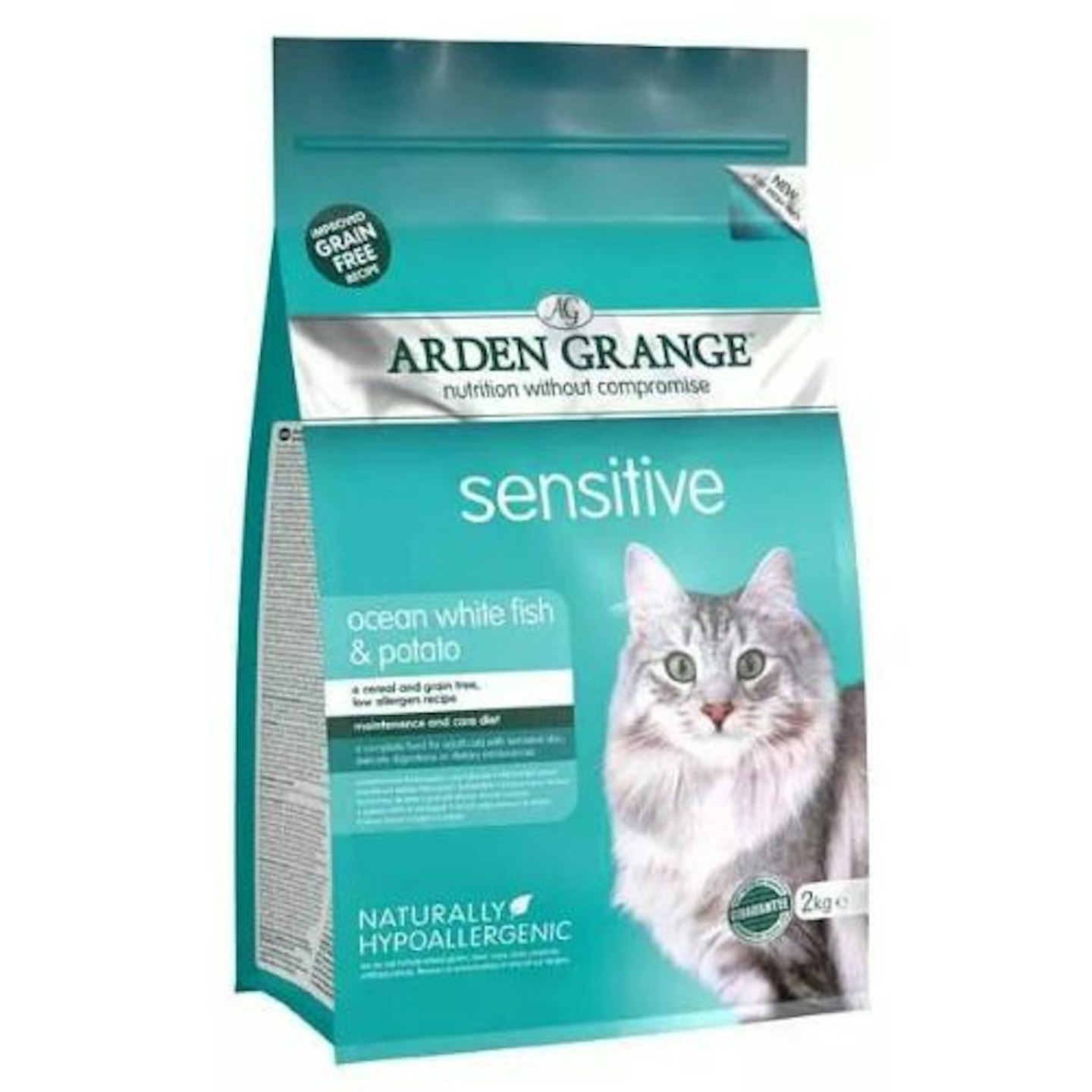 Arden Grange
Arden Grangewww.viovet.co.uk
If your cat is prone to a sensitive tummy or finds it hard to digest rich wet food, Arden Grange Sensitive Fish and Potato Grain is a premium cat food that has been created for adult cats with particularly sensitive skin or stomachs.
As well as being suitable for sensitive skin and digestion, this food is a great choice for indoor cats with an intolerance to cereals and grains because it's made without them. It also contains 26 per cent fresh white fish and 24 per cent white fish meal so that's a good proportion of the overall food that is a protein source.
As another fishy recipe, it has a strong smell so that's something to bear in mind if you're looking for food for your cat that isn't very potent. We love that the overall size of the kibble is smaller so it's an ideal choice for smaller cats.
Pros
- Grain-free so great choice for cats with intolerances to cereals and grains
- Small kibble so ideal for smaller cats' mouths
- Made with a high percentage of fish
Cons
- Strong smelling
| Quantity: | 400g, (2kg, 4kg) |
| Food type: | Dry |
| Ingredients: | Fresh white fish, potato, white fish meal, chicken oil, egg powder, pea starch, chicken digest, krill, yeast extract, malt extract, pea fibre, minerals, prebiotic FOS, prebiotic MOS, cranberry extract, glucosamine, MSM, chondroitin, nucleotides, rosemary extract |
- Contains 26 per cent fresh white fish and 24 per cent white fish meal
- Grain-free
- Includes prebiotics, joint supplements, krill and yucca extract
Best tailored cat food subscription
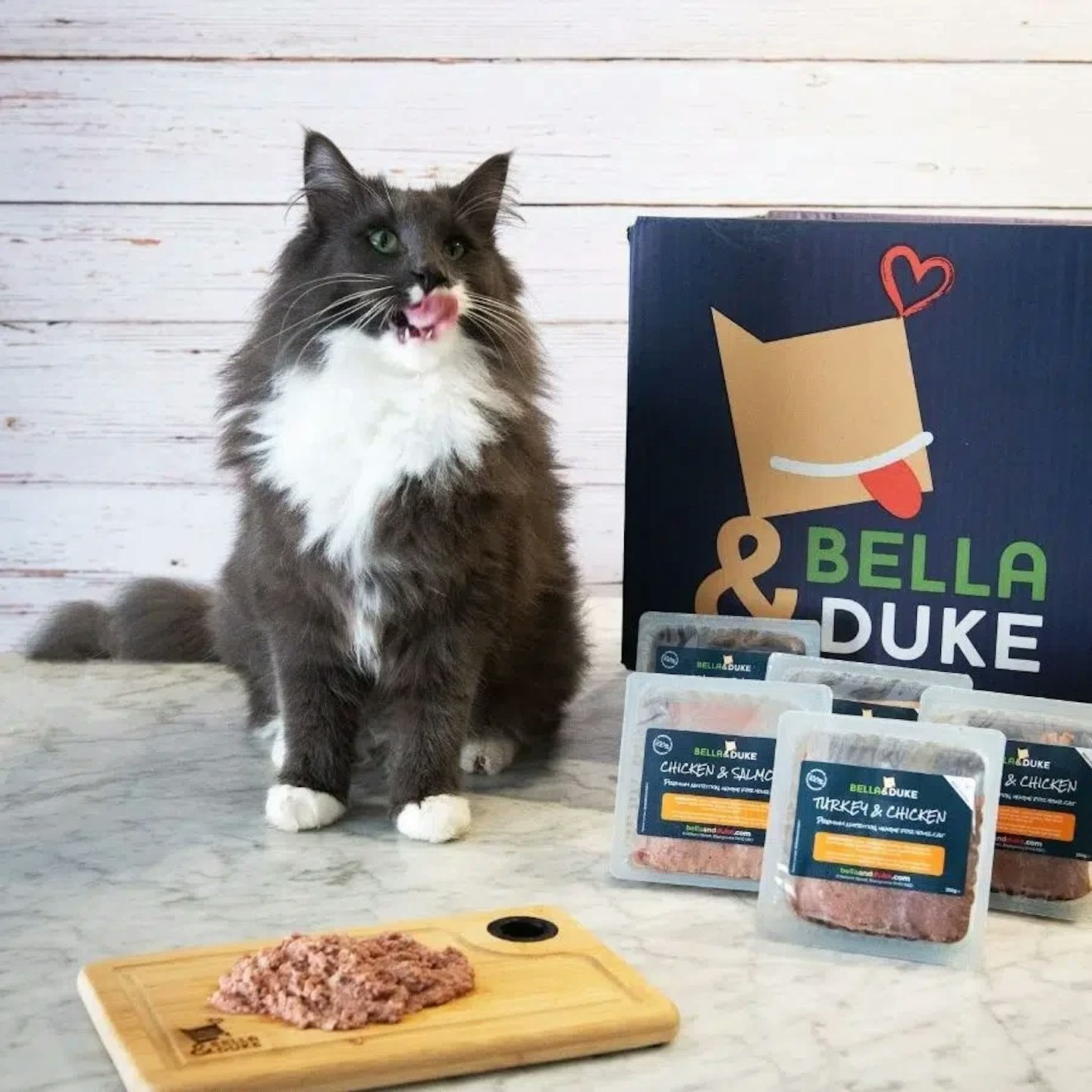 Bella and Duke
Bella and Dukewww.bellaandduke.com
Cat food subscriptions have become popular in recent years as they allow owners the option to order personalised food direct to their door each month. This means no sudden rush to the supermarket to grab food as you've run out.
Bella and Duke offer healthy raw cat food meals that are pet and veterinarian-approved. Designed to support your pet’s health and happiness from the inside out and is 100 per cent natural. The food will help balance their energy levels, support their digestion and immune system and keep their skin and coat looking healthy and glossy.
Customers love the convenience of this food and how the company gives you updates on the progress of your order. As it's a subscription-based food service, you'll need to make sure you give plenty of notice if you want to change/cancel your order. Some reviews on Trustpilot mention they've found small bones in their cat's food but the brand gives assurances that the food goes through multiple grinders to ensure both the meat and bones are ground to a digestible size.
Pros
- Delivered straight to your door
- 100 per cent natural ingredients as it's a raw food
- Veterinarian-approved
Cons
- A subscription service, so you will have to keep on top of things if you wish to cancel
| Quantity: | 250g individual tubs in 4kg, 8kg, 12kg, 16kg and 20kg boxes |
| Food type: | Raw food |
| Ingredients: | Meat with bone, fish, organ meat and fish oils |
- Completely tailored to your cat's age, weight and activity levels
- Create meal plans based on your cat's needs
- Frozen raw food in convenient 250g tubs
How we chose the best cat food for itchy skin and allergies
All of these cat foods for allergies have been hand-selected by our team of Take A Break Pets shopping experts. We carefully considered the nutrition and quality and value in our selection of the best. Our team has spent hours investigating and researching cat food for itchy skin and allergies to make it easier for you to find the very best, and we'd never recommend a product we don't believe in.
With pets big and small on our team, where possible we'll share the best products that have been tried and tested by our own furry friends who have given their paw of approval. And, with help from veterinary experts, we share their knowledge to ensure everything we choose is paw-fect for your pet.
Best cat food for itchy skin and allergies FAQs
What cat food or diet do you recommend for cats with itchy skin and allergies?
Dr Michael Lazaris, small animal vet and co-director Vets on the Common, advises:
"Allergies in cats follow most of the same principles as in dogs. In most cases, the itchiness may be caused by something other than the food, such as fleas or irritants in their environment. Your vet will be able to rule out some common causes of itchiness as well as provide some immediate relief before your cat causes nasty sores from all the scratching.
"There are several high-quality cat foods on the market specifically aimed at cats with itchy skin, which help improve their skin barrier and coat quality. Adding ingredients like fish oil with omega fatty acids can help too.
"If your vet suspects a true dietary allergy, they may advise a hydrolysed diet trial, which allows you to see if food is the main problem. Hydrolysed diets break down the ingredients in the food so that your cat or dog can't react to it (therefore no allergic reaction). If a cat or dog on a hydrolysed diet stops being itchy or having diarrhoea, this can confirm that they were allergic to something in their previous diet (usually an animal protein). You can then choose to keep them on this hydrolysed diet long term (as it is complete) or try a new food with different ingredients to their old food."
How do I put my cat on a food-elimination diet?
A food elimination diet should be conducted over a set period of time, in which your cat eats one type of food only. Because some cat foods contain a lengthy list of ingredients it can be a long process, requiring methodical testing and patience. It must not be contaminated with any kind of supplements, treats or drinks other than water.
You can do a food-elimination diet even if your cat goes outdoors. It's worth letting your neighbours know so they don't give your pet any treats. On balance, keeping your cat inside would be stressful if they're used to going outside.
You can approach the food trial in several ways. Either by starting with a novel protein (more on that below) and slowly reintroducing other ingredients back in.
Alternatively, a single-source protein diet features one type of protein, not necessarily as exotic as the types of meat on a novel protein diet. Commercially produced single-source protein cat foods, such as the products from AATU, take all the faff out of preparing and cooking meat for your cat. Additionally, commercial cat foods are supplemented with essential fatty acids, vitamins, minerals and antioxidants to give your cat a complete diet.
Finally, there is the hydrolysed protein diet. Pro Plan Veterinary Diets Hypoallergenic Dry Cat Food is an example of a dry cat food where the proteins have been broken down so the immune system does not detect them and therefore cannot react to them. It is the process of hydrolysis that can make a meat protein, such as chicken or fish, digestible to a cat with an intolerance. This is a commercial process and cannot be replicated at home.
Before you embark on the food trial proper, gradually introduce the new food with their old over the course of a week or two. When they are fully switched over that's when you start the food trial. In stage one of a food elimination diet strictly only feed your cat the new diet that you have chosen for 6-8 weeks. Keep a record of any changes to their symptoms.
In stage two, begin to reintroduce small amounts of your cat's old food. Within a couple of days, you'll see your cat's symptoms reappear if they are indeed allergic to something in their old food. Only give small amounts of the food, as a sudden switch will cause an upset regardless of an allergy.
If your cat's symptoms have returned revert back to the new diet. Longer term, you could keep your cat on their new diet if they are enjoying it and it's providing complete wellness and nutrition. Or you could further investigate whether isolated ingredients, such as chicken or wheat, are the trigger of your cat's allergy.
It should be stated that if food doesn't appear to be the cause of your cat's itchiness look at environmental factors or parasites. Finally, be sure to consult your vet before you embark on a food-elimination diet. Your vet can do comprehensive allergy testing to determine the root cause of your cat's skin irritation.
What's a novel protein diet?
A novel protein diet is a meat that your cat will have never eaten before and therefore not developed an allergy to it. This can be expensive as the meat sources are exotic or premium, such as kangaroo, ostrich, venison, wild boar, rabbit and even alligator. This could be a useful short-term dietary switch if you embark on a food-elimination diet with your cat.
Another option is a single-source protein diet containing protein from one animal source only. Again it's expensive as it's produced with a small number of quality ingredients, but it's effective in stopping adverse food reactions.
This article contains expert advice from Dr Michael Lazaris. Dr Michael is a small animal vet and co-director of his practice, Vets on the Common, in London. You can also find him on Instagram and TikTok, where he shares all the latest pet advice and adorable patients he treats.
Natalie Knowles is a Homes & Garden Product Writer for Take A Break Pets, specialising in all things cats and dogs. In her other life Natalie is a successful artist and illustrator.

